You’ll need at least an Intel Core i5-4590 or AMD Ryzen 5 1500X for basic wireless VR, but these are absolute minimums that may cause performance issues. For ideal experience, consider AMD Ryzen 7 9800X3D or Intel Core Ultra 7 265K, which offer the strong single-thread performance that’s essential for VR responsiveness. Clock speeds matter more than core counts for wireless VR gaming. These processors handle real-time rendering, tracking calculations, and wireless data transmission without bottlenecks that could ruin your immersion, and understanding the full performance picture will help you make the smartest choice.
Understanding Wireless VR Processing Demands
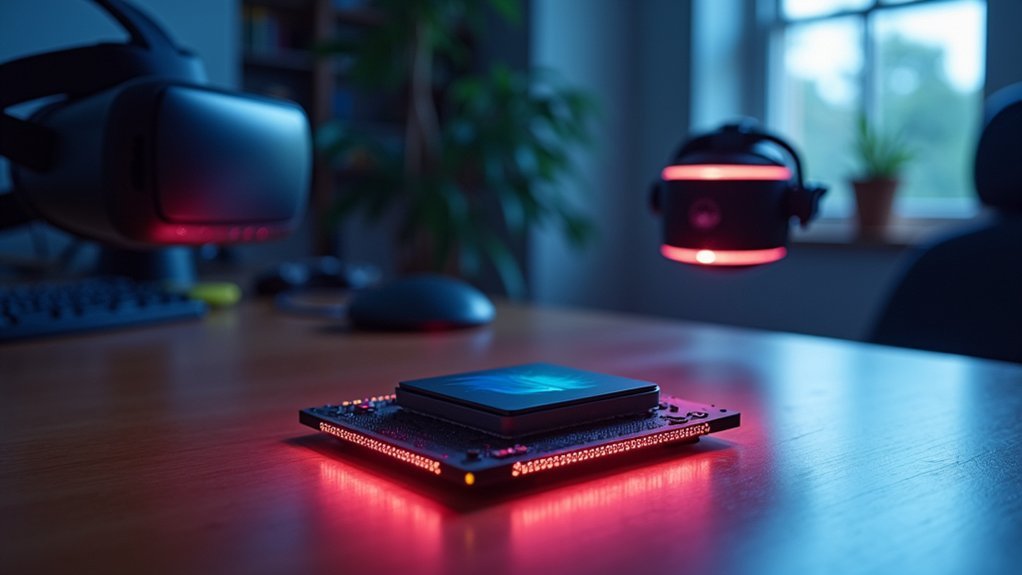
When you’re diving into wireless VR, your CPU becomes the critical bottleneck that determines whether you’ll experience seamless immersion or frustrating stutters. Understanding CPU requirements is essential for achieving good VR performance in wireless setups.
Your processor needs to handle real-time rendering, tracking calculations, and wireless data transmission simultaneously.
Single-threaded performance takes priority over core count since VR applications rely heavily on quick processing of user inputs and rendering instructions. You’ll need at least an Intel Core i5-4590 or AMD Ryzen 5 1500X to meet minimum specifications.
However, higher clock speeds dramatically improve your experience by reducing latency and boosting frame rates. While multi-core processors help manage background tasks, your CPU’s ability to execute single-threaded operations quickly remains the most critical factor for smooth wireless VR gaming.
Minimum CPU Specifications for Wireless VR Gaming
Although wireless VR gaming has become more accessible, you’ll still need to meet specific CPU benchmarks to avoid performance issues that can ruin your experience.
The minimum cpu specifications for wireless VR typically require an Intel Core i5-4590 or AMD Ryzen 5 1500X to guarantee adequate performance levels.
Meeting the Intel Core i5-4590 or AMD Ryzen 5 1500X minimum requirements ensures your wireless VR setup delivers smooth, uninterrupted gaming performance.
If you’re using anything below these specifications, like the Intel Core i5-4460, you’ll likely encounter high CPU usage and struggle with demanding VR applications.
These older processors simply can’t handle the computational load that wireless VR demands.
You’ll want to prioritize CPUs with strong single-thread performance and sufficient core counts.
While these minimum specifications will get you started, remember that they represent the bare threshold—expect basic functionality rather than peak performance in more intensive VR experiences.
Top CPU Recommendations for Wireless VR Performance
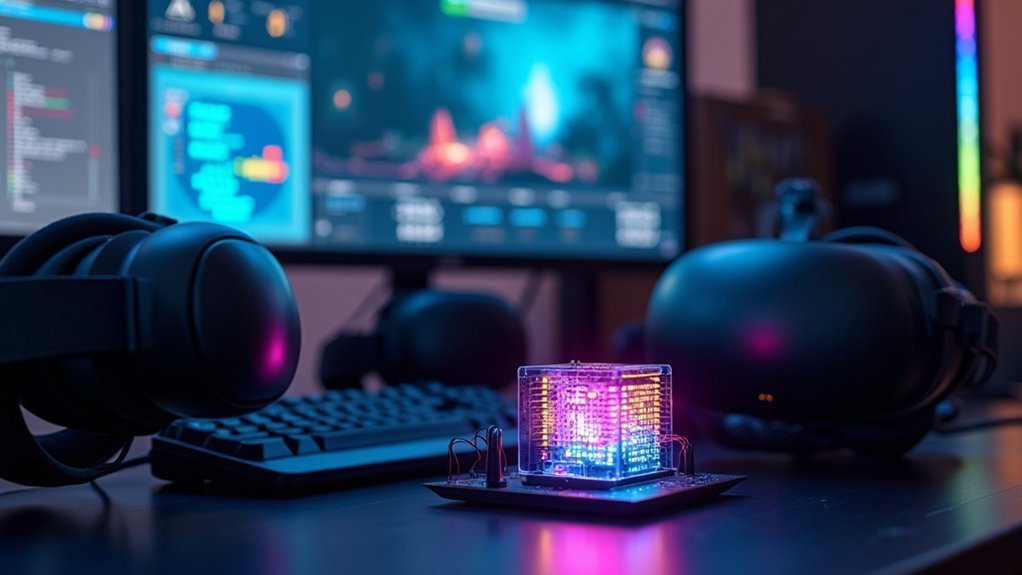
You’ll want to take into account the best CPUs that balance raw performance with power efficiency for your wireless VR setup.
The top processors deliver exceptional single-thread performance while managing heat output effectively, since wireless headsets can’t rely on external cooling like tethered systems.
Choosing the right CPU now will guarantee your system handles current VR demands and remains capable as wireless technology advances.
Best Wireless VR CPUs
Performance matters most when selecting a CPU for wireless VR, and several standout processors deliver the power you need for immersive experiences.
The AMD Ryzen 7 9800X3D leads the pack with exceptional gaming performance and 3D V-Cache technology, offering an ideal balance of cores and clock speed.
For Intel users, the Intel Core Ultra 7 265K provides a significant performance boost with 20 cores and 5.5GHz boost speeds, ensuring smooth wireless VR operation.
Budget-conscious users shouldn’t overlook the AMD Ryzen 5 7600X, delivering solid performance with 6 cores and 5.3GHz boost speeds.
For demanding high-end applications, the Intel Core i9-14900K dominates with 24 cores and impressive 5.8GHz boost speeds, handling the most intensive wireless VR experiences effortlessly.
Performance Vs Power Efficiency
When selecting a CPU for wireless VR, you’ll face the critical trade-off between raw performance and power efficiency. High-end CPUs like the Intel Core i9-14900K deliver exceptional performance with 24 cores and 5.8GHz boost speeds, but consume more power.
Meanwhile, processors like the Intel Core Ultra 7 265K balance both aspects effectively with 20 cores and efficient power management.
For wireless VR, performance often takes priority since smooth frame rates and low latency are essential. However, power efficiency matters for sustained performance and thermal management during extended VR sessions.
- High-end CPU options prioritize maximum performance over power consumption for demanding applications
- Balanced processors offer ideal performance per watt for most wireless VR scenarios
- Clock speeds matter more than core counts for VR responsiveness and single-threaded performance
Future-Proofing Wireless Setups
As wireless VR technology continues advancing rapidly, selecting the right CPU today guarantees your system won’t become obsolete within a few years.
You’ll want processors with high clock speeds and robust multi-core capabilities to handle evolving VR demands.
The AMD Ryzen 7 9800X3D stands out for future-proofing, thanks to its exceptional single-thread performance and 3D V-Cache technology. This processor excels at demanding VR applications that’ll emerge in coming years.
The Intel Core i9-14900K offers premium longevity with its 5.8GHz boost clock and 24 cores, ensuring seamless performance for intensive wireless VR tasks.
For balanced future-proofing, consider the Intel Core Ultra 7 265K’s 20 cores and high clock speeds. These specifications accommodate tomorrow’s wireless VR technology while delivering excellent performance today.
AMD Vs Intel: Which Performs Better for Wireless VR
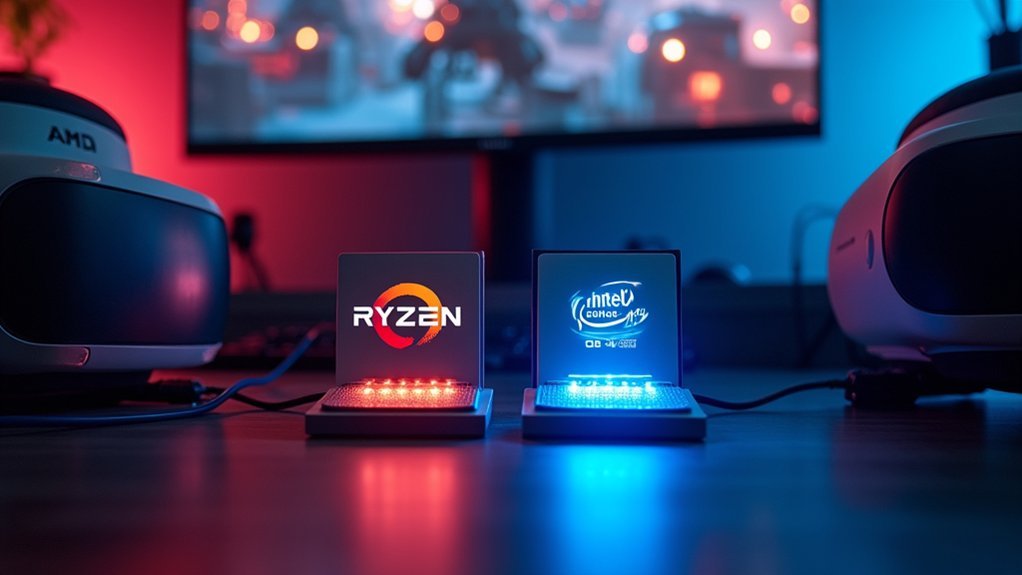
When choosing between AMD and Intel for wireless VR, you’ll need to compare how each handles single-threaded workloads since VR applications rely heavily on per-core performance.
You should also consider power efficiency, as wireless VR headsets generate heat and consume battery power that can impact your gaming sessions.
Finally, you’ll want to evaluate which platform offers better future-proofing to guarantee your CPU can handle upcoming VR technologies and software updates.
Single-Thread Performance Comparison
Performance battles between AMD and Intel reach new heights when you’re choosing a CPU for wireless VR, where single-thread performance can make or break your immersive experience.
Intel’s Core Ultra 7 265K leads with its impressive 5.5GHz P-core boost clock, delivering exceptional responsiveness for latency-sensitive VR applications. However, AMD’s Ryzen 7 9800X3D shouldn’t be overlooked, offering robust single-thread performance at 5.2GHz with architectural optimizations that enhance wireless VR scenarios.
Recent benchmarks consistently show Intel’s advantage in single-thread tasks, which directly translates to smoother wireless VR experiences. Your CPU performance depends heavily on these single-core capabilities since VR applications prioritize individual core responsiveness over multi-threading.
- Clock speeds above 5GHz markedly reduce frame-time variance in wireless VR streaming
- Architecture optimizations matter more than raw core counts for VR latency reduction
- Single-thread benchmarks correlate directly with wireless VR smoothness and responsiveness
Power Efficiency Analysis
While single-thread performance determines your wireless VR’s responsiveness, power efficiency becomes equally critical for sustained gaming sessions without thermal throttling or excessive energy consumption.
AMD’s Ryzen series consistently outperforms Intel in performance-per-watt ratios, making them superior for wireless VR applications.
The Ryzen 7 5800X3D exemplifies this advantage with its 120W thermal design power while delivering exceptional performance through 3D V-Cache technology.
In contrast, Intel’s Core Ultra 7 265K operates at 125W base but can surge to 250W under load, potentially causing overheating during intensive wireless VR sessions.
For budget-conscious users, the Ryzen 5 7600X offers ideal balance at 105W TDP.
You’ll experience longer gaming sessions with AMD processors since they generate less heat and consume less power than Intel counterparts.
Future-Proofing Considerations
Beyond immediate power considerations, your CPU choice today determines how well your wireless VR system will handle tomorrow’s demanding applications.
The AMD Ryzen 7 9800X3D excels in future-proofing with its superior single-thread performance and 3D V-Cache technology, perfectly suited for evolving VR headset requirements.
Intel’s Core i9-14900K offers robust future-readiness through high core counts and clock speeds that’ll accommodate VR technology advancements.
For balanced future-proofing, the Intel Core Ultra 7 265K’s 20 cores and 5.5GHz boost deliver excellent longevity.
Budget-conscious users can rely on the Ryzen 5 7600X’s 5.3GHz performance for entry-level future-proofing.
- Processing Evolution: Next-generation VR applications will demand higher CPU performance than current titles
- Headset Advancement: Future VR headsets will likely require more computational power for enhanced features
- Technology Integration: Emerging VR technologies like eye-tracking and haptic feedback increase CPU workload requirements
CPU Bottlenecks in Wireless VR Streaming
When your CPU can’t handle the intensive data processing demands of wireless VR streaming, you’ll experience the frustrating effects of a CPU bottleneck. Your frame rates will drop, latency will increase, and VR gaming becomes choppy and uncomfortable.
Even powerful graphics cards won’t help if your processor can’t keep pace. Intel Core i5-4460 and similar older models fall below VR minimum requirements, causing noticeable performance degradation.
You’ll see CPU usage hitting 100% consistently, signaling your processor is overwhelmed. Surprisingly, even newer setups like the i5-7600k paired with high-end graphics cards can still bottleneck wireless VR streaming.
The wireless transmission adds extra computational overhead that your CPU must handle alongside game processing. Outdated drivers can worsen these bottlenecks, making regular updates essential for peak performance.
How Clock Speed Affects Wireless VR Experience
Clock speed serves as the heartbeat of your wireless VR experience, determining how quickly your CPU can process the constant stream of data required for smooth gameplay. Higher clock speeds directly translate to better single-thread performance, which is essential for maintaining low latency and preventing frame drops that can break immersion.
When you’re choosing a CPU for wireless VR, prioritizing clock speed over core count often yields superior results. The Intel Core Ultra 7 265K’s 5.5GHz boost and AMD Ryzen 7 9800X3D’s 5.2GHz performance demonstrate how faster processing enhances responsiveness and reduces lag.
- Reduced Input Lag: Higher clock speeds minimize the delay between your movements and their representation in VR
- Smoother Frame Delivery: Faster processing ensures consistent frame rates without stuttering or drops
- Enhanced Responsiveness: Quick data handling improves overall system reaction time for better immersion
Multi-Core Performance Requirements for VR Encoding
While clock speed handles the rapid-fire calculations, your CPU’s multi-core performance becomes the workhorse that manages VR encoding’s complex demands.
You’ll need at least 6 cores for ideal VR encoding, though higher CPU options like the AMD Ryzen 7 5800X3D or Intel Core i9-14900K deliver superior multi-threading capabilities for demanding applications.
Your system benefits greatly from CPUs with 12+ threads, which handle background tasks while maintaining smooth rendering.
CPUs with 12+ threads excel at juggling background processes while delivering seamless VR rendering performance.
Multi-core performance prevents bottlenecks by distributing encoding workloads across multiple cores simultaneously. This parallel processing reduces stutter and lag during wireless sessions.
When you’re streaming VR content wirelessly, your CPU’s ability to offload encoding tasks to additional cores guarantees consistent performance.
A higher CPU with strong multi-core architecture keeps your wireless VR experience fluid and responsive.
Budget CPU Options That Handle Wireless VR
Although powerful CPUs deliver exceptional wireless VR performance, you don’t need to break the bank to enjoy smooth VR experiences. Several budget CPU options can handle wireless VR effectively when building your VR setup.
The AMD Ryzen 5 7600X stands out as the best budget choice, featuring 6 cores and 5.3GHz boost speeds that deliver good performance across demanding VR applications. For entry-level users, the AMD Ryzen 3 3300X offers 4 cores at 4.3GHz, providing adequate wireless VR capability for budget-conscious gamers.
Key considerations for budget wireless VR CPUs:
- Aim for at least 4 cores with boost speeds around 4.0GHz minimum
- Intel’s i5-4590 meets basic requirements, but i5-8400 offers better performance
- AMD Ryzen 5 5600G provides enhanced performance while maintaining affordability
Premium CPUs for High-End Wireless VR Setups
For enthusiasts seeking the ultimate wireless VR experience, premium CPUs deliver the raw processing power needed to handle the most demanding VR applications without compromise.
The Intel Core i9-14900K stands as the pinnacle choice, offering 24 cores and boost speeds up to 5.8GHz for exceptional performance in high-fidelity VR environments.
With 24 cores and 5.8GHz boost speeds, the i9-14900K delivers uncompromising performance for the most demanding VR experiences.
The AMD Ryzen 7 9800X3D brings revolutionary 3D V-Cache technology to premium VR, delivering outstanding gaming performance with its 8 cores and 5.2GHz boost clock.
Meanwhile, the Intel Core Ultra 7 265K provides balanced excellence with 20 cores and 5.5GHz speeds, perfectly suited for multitasking while running demanding VR applications.
These high-end CPUs don’t just enhance frame rates—they notably improve responsiveness and reduce latency, ensuring your wireless VR sessions remain smooth and immersive even when graphical power demands peak.
CPU Compatibility With Popular VR Headsets
When selecting a CPU for wireless VR, verifying compatibility with your specific headset becomes just as important as raw processing power. Different VR headsets have varying requirements that directly impact your wireless experience.
The Meta Quest Link and HTC Vive Pro 2 both require at least an Intel i5-4590 or AMD Ryzen 5 1500X equivalent to handle demanding graphics processing. Meanwhile, the Valve Index needs a dual-core processor with hyperthreading or better to maintain peak performance and reduce latency.
CPU compatibility considerations for wireless VR:
- Clock speed and core count must meet your headset’s specific requirements for seamless streaming
- Performance issues arise when processors fall below minimum specifications, especially with demanding titles
- Exceeding minimum requirements prevents bottlenecks and guarantees consistent wireless VR performance across all applications
Upgrading Your Existing CPU for Wireless VR
Understanding compatibility requirements puts you in a strong position to evaluate whether your current CPU meets wireless VR demands.
If you’re running below Intel Core i5-4590 or AMD Ryzen 5 1500X minimums, upgrading becomes essential for ideal VR performance.
For existing AM4 systems, the Ryzen 5800X3D offers excellent performance boosts while letting you reuse DDR4 RAM.
If you’re building new, high-end options like AMD Ryzen 7 9800X3D or Intel Core i9-14900K deliver superior single-thread performance vital for smooth VR experiences.
Consider the Intel Core Ultra 7 265K’s 5.5GHz boost clock for enhanced wireless VR responsiveness.
When upgrading, verify motherboard compatibility and consider future-proofing with newer architectures like AMD’s AM5 platform for long-term VR performance benefits.
Future-Proofing Your CPU for Next-Gen Wireless VR
As wireless VR technology rapidly evolves toward higher resolutions and more complex experiences, you’ll want a CPU that can handle tomorrow’s demanding applications without requiring another expensive upgrade.
Prioritize processors like the AMD Ryzen 7 9800X3D or Intel Core i9-14900K that deliver exceptional high single-thread performance for current VR demands while offering the headroom for future requirements.
Modern VR experiences demand processors like the Ryzen 7 9800X3D and Core i9-14900K for exceptional performance today and tomorrow.
Consider investing in CPUs with higher core count, such as Intel’s Core Ultra series, to accommodate upcoming multi-threaded VR applications.
Look for processors supporting PCIe 4.0 and beyond to guarantee faster data transfer rates essential for next-generation wireless headsets.
- Target CPUs with boost clock speeds exceeding 5.0GHz for sustained performance in resource-intensive environments
- Choose platforms like AMD’s AM5 for enhanced compatibility with emerging VR technologies
- Prioritize processors offering both current capability and future expandability
Frequently Asked Questions
What CPU Is Recommended for VR?
You’ll want an AMD Ryzen 7 9800X3D for best overall VR performance, or Intel’s Core Ultra 7 265K. Budget users should consider AMD Ryzen 5 7600X for solid entry-level experiences.
What Is the Best CPU for Flight Sim VR?
You’ll want the AMD Ryzen 7 9800X3D for flight sim VR. Its 3D V-Cache technology and excellent single-thread performance handle demanding simulations perfectly, delivering smooth frame rates in immersive cockpit experiences.
Does CPU Matter With VR?
Yes, your CPU greatly matters for VR. It processes instructions, coordinates components, and impacts responsiveness. You’ll need strong single-thread performance to avoid bottlenecks and guarantee smooth, immersive experiences in demanding applications.
What Is the Minimum AMD CPU for VR?
You’ll need at least an AMD Ryzen 5 1500X as the minimum CPU for VR compatibility. However, you should consider upgrading to a Ryzen 5 3600 for better performance in demanding applications.
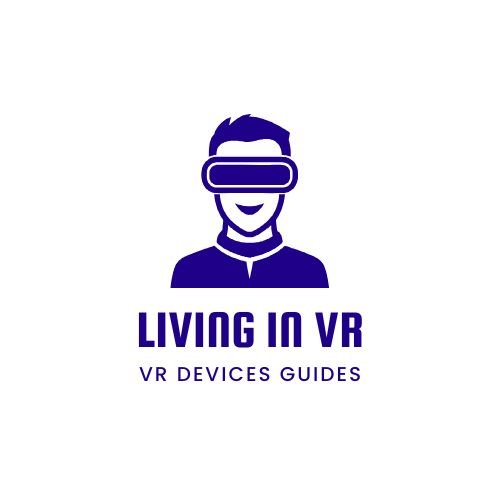
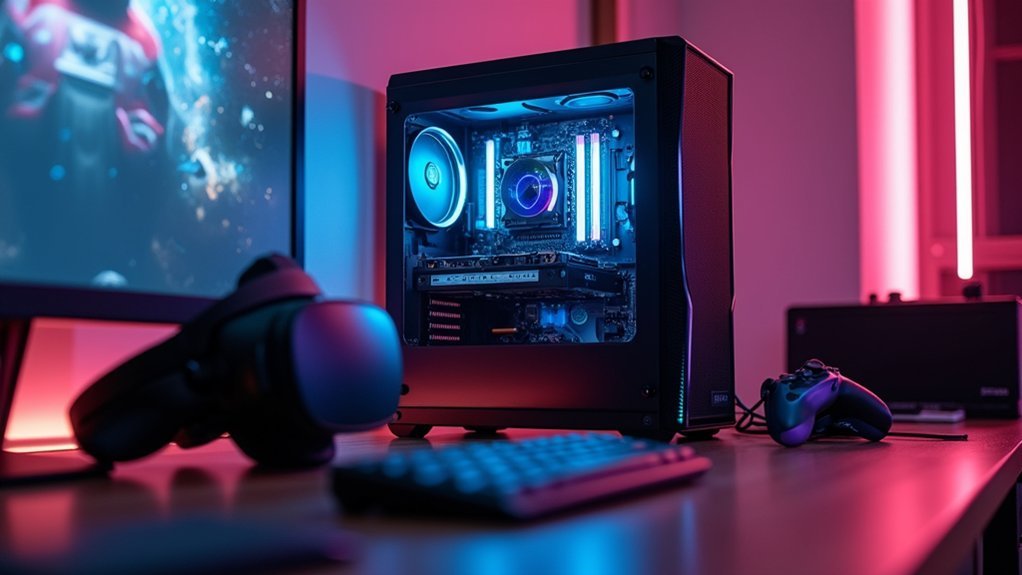
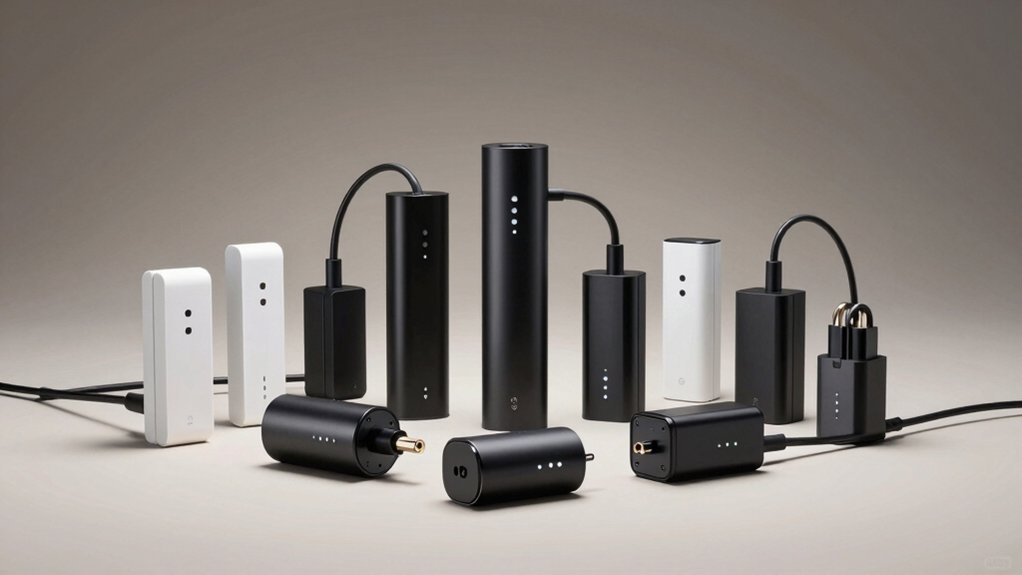
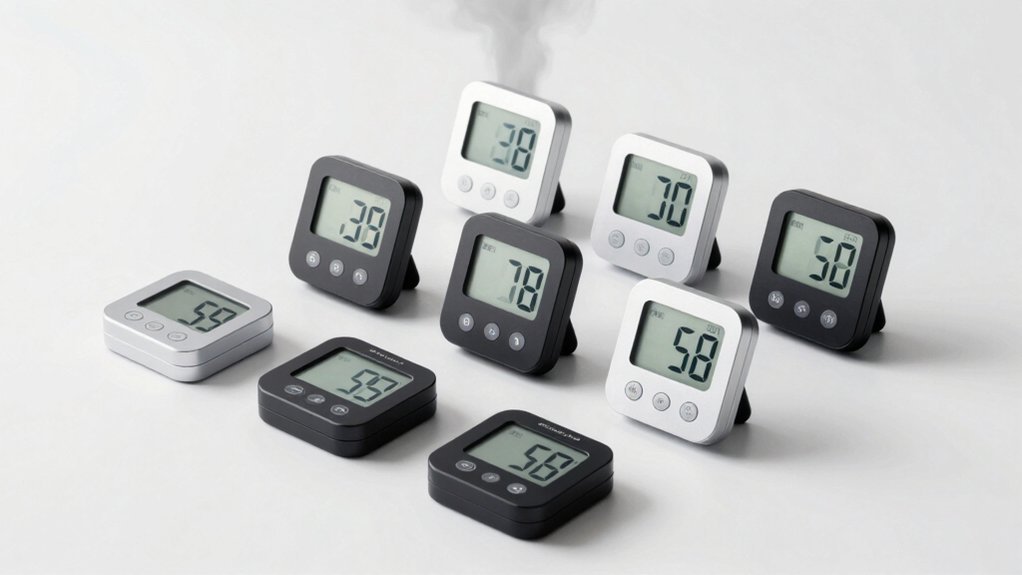

Leave a Reply